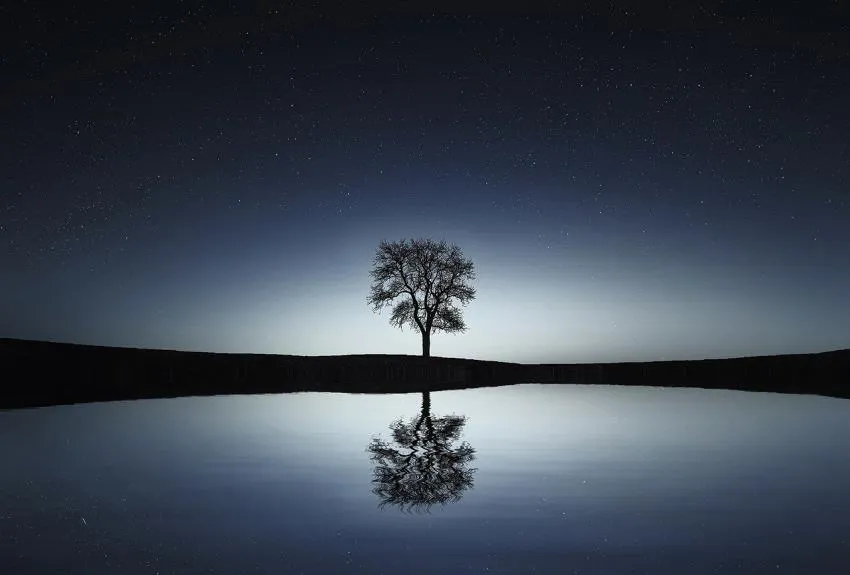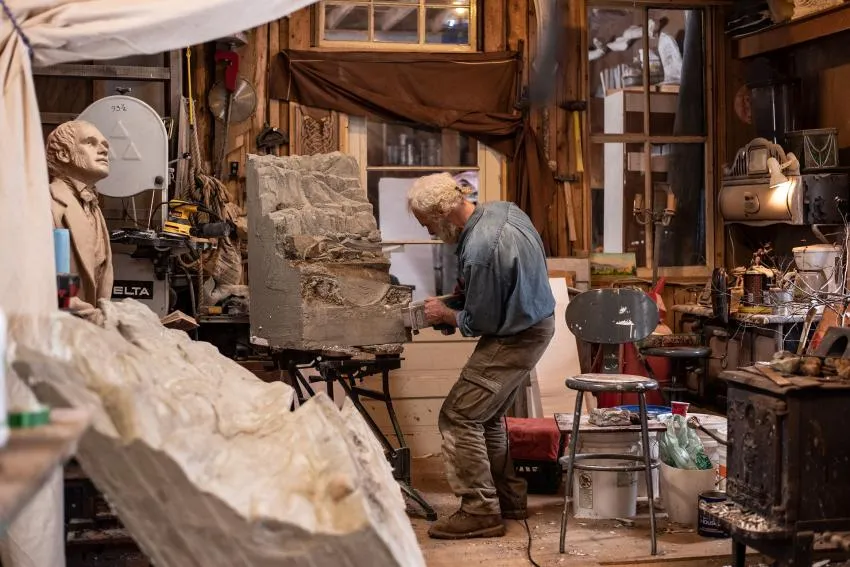Why Hobbits Love All Things That Grow — The "Deeper Magic" In J.R.R. Tolkien And C.S. Lewis

For all hobbits share a love for things that grow.
I’ve been fascinated by this phrase ever since my first reading of The Lord of the Rings, years ago. I felt there was some deep magic in it. It spoke right into the gaping hole in my heart that yearned for woods, lakes, skies, and mountains.
I grew up in a big city amid concrete and asphalt. A few trees here and there in a handful of parks provided little consolation and could not compensate for being crowded out by man-made things.
Man-made things don’t grow. They are made. Made for a specific practical purpose. They are a piece of material bent into shape. They are made to fit.
A gas station is JUST a gas station. There’s nothing else to it. It’s made precisely so that there would be nothing else to it. It’s a place to get some gas, grab some grub, and go.
A store is just a store. A building is just a building. A car is just a car. Man-made things are always reduced to less than they could be. In fact, they don’t leave any room for imagination. They don't loom large. They are made to be utilized, not loved.
They are not made to be admired, they inspire no awe, they are made to control and manage reality. As such, they epitomize what J.R.R. Tolkien called The Machine.
What does the One Ring signify?

The one Ring is the ultimate Machine, a technology used to control other wills. In J.R.R. Tolkien’s philosophy, the Machine is an external technique or device designed to subdue reality to my will.
By the last [the Machine] I intend all use of external plans or devices (apparatus) instead of development of the inherent inner powers or talents — or even the use of these talents with the corrupted motive of dominating: bulldozing the real world, or coercing other wills. The Machine is our more obvious modern form though more closely related to Magic than is usually recognized. . . The Enemy in successive forms is always ‘naturally’ concerned with sheer Domination, and so the Lord of magic and machines.
What type of magic is used in The Lord of the Rings?

There are two types of magic in The Lord of the Rings. One is the Machine, and the other one is Art. The Machine is using external means to bulldoze reality into your mold. Art is the magic that grows out of who you are. The reason hobbits love all things that grow is that they are attuned to the "deeper magic."
C.S. Lewis mentions this "deeper magic" in The Lion, the Witch, and the Wardrobe when he says of the White Witch:
The Witch knew the Deep Magic...but there is a magic deeper still which she did not know. Her knowledge goes back only to the dawn of time. But if she could have looked a little further back, into the stillness and the darkness before Time dawned, she would have read there a different incantation.
In Magician's Nephew, we see this deeper magic unfold in the way Narnia springs into existence from the primeval darkness — as an echo of the Song. The deeper magic of Aslan's Song makes all things grow. All living things literally spring out of the ground, from the soil of the earth.
Technically, the White Witch was there, in Narnia, but, preoccupied as she was with domination, she was unable to see what was happening in the stillness and darkness before the dawn of Time. Namely, she didn't see the deeper magic that flowed out of Song — the magic of growing. Nor did she hear the Song.
The Song, or the Music of the spheres, is "the deeper magic" that hobbits and Elves are in tune with. They love all things that grow. This deeper magic makes them immune to the evils of the world. That's why the Shire is the way it is — lush and full of simple joys. Its magic is deeper. It grows from the soil.
“It is no bad thing to celebrate a simple life.”
The Elves are also in tune with the deeper magic because their magic is Art. Art is internal — it grows from inside out, echoing the Music of the Ainur. What is this Music and how do we learn the deeper magic flowing out of it? There is a beautiful story told by William Paul Young that demonstrates the power of Music.
How is a violin built?

William Paul Young, the author of The Shack, tells a wonderful story of how masterful violin-makers go about making violins. First, they go to a bend in the river, searching for hollow logs washed to the shore. They go around tapping each one of them, listening to the sound they make.
The key is to find the log that makes the most unique sound. Then, after drying it for a while, the craftsman starts to carefully carve the log, applying as little force as possible. The idea is — you will get the best-sounding instrument if you “follow the material.”
Violin-makers claim that the best sound is produced by logs that have grown in the worst of conditions — the crooked and crude ones. By respecting the uniquely broken fiber of the wood, the craftsman makes a violin that truly sings.
If you want to hear songs, you need to let things be as they are. It is true Art to see what the material requires. True Art is the opposite of the Machine. It is "the deeper magic."
Is modern technology magic?
Arthur C Clarke, a brilliant writer, and futurist formulated a law that states,
"Any sufficiently advanced technology is indistinguishable from magic."
J.R.R. Tolkien would probably add that modern technology is not just magic but black magic because it works like the Machine — it allows its wielder to subdue reality by performing certain external actions (saying an incantation, boiling a snake in a pot, or pushing buttons). Black magic is not concerned with who you are or what your character is as long as you correctly perform the rite.
Black magic is akin to modern technology — just push the right button and you will get what you want. Modern technology doesn’t care about who you are or what is in your heart. It cares about whether you have pushed the correct buttons or followed the right procedure. If you have, it helps you to bulldoze reality into your mold.
When we force something into a mold, we break the soul of the thing, even if we are trying to improve it.
Do Elves work magic in the Lord of the Rings?

The magic of the Elves is art. It grows out of their character and is the reflection of who they are. The Machine is the province of those who lust for power; Art is the province of the Elves.
‘Are these magic cloaks?’ asked Pippin, looking at them with wonder.
‘I do not know what you mean by that,’ answered the leader of the Elves. ‘They are fair garments, and the web is good, for it was made in this land. They are Elvish robes certainly, if that is what you mean. Leaf and branch, water and stone: they have the hue and beauty of all these things under the twilight of Lorien that we love; for we put the thought of all that we love into all that we make.
Properly speaking, these cloaks were not made; they grew out of their love of Lórien. Their magic was spun by the twilight under the stars of Varda.
When we grow something, — whether it's a tomato plant, a child, an idea, or a project — we cannot force it into any preconceived mold. We must let it unfold as it will. Of course, we can try to make a tomato grow faster by force, but we will break it in the process.
Forcing is the opposite of growing. Growing is allowing things to unfold as they will. Forcing is imposing your will upon another. As Treebeard says of Saruman,
“He is plotting to become a Power. He has a mind of metal and wheels; and he does not care for growing things, except as far as they serve him for the moment.”
Forcing is bending the material to fit your mold. Growing is giving up all molds to let the thing be what it is. Growing means you nurture what you have sown, eagerly waiting for it to unfold.
You desire a dialogue, not domination. You desire to see the magic of growth. But where does this magic come from?
How did Narnia begin?

At the beginning of Narnia, there was the primeval stillness and darkness that C.S. Lewis refers to in his first Chronicle. This stillness gave rise to the deeper magic, the magic of growing.
Whether you are making a violin, cooking a meal, or growing tomatoes, you need to still your own preconceived mental images of what "the thing should be" and allow it to be what it is.
"Every block of stone has a statue inside it and it is the task of the sculptor to discover it.” Michelangelo
Do you love what you make? If so, you will be "following the material." You will be interested in the dialogue, not domination. Like a hobbit, you will be growing things — not forcing them into existence. Like an Elf, you will infuse all your art with the twilight of Lorien.
People will look at the work of your hands and will see "leaf and branch, water and stone" — the hue and beauty of everything you love.
As we let go of the desire to dominate, our inner stillness will suddenly transmute into "hearing." What will we hear when we stop all inner striving and let go of our insatiable desire to control? Suddenly, the stillness of the moment will reward us with an enchanting sound, a call.
“Deep calls unto deep in the roar of your waterfalls" Psalm 42:7
What you hear is the Music of the Ainur, the voice of the Spirit.
"The wind bloweth where it will, and you hear its voice..."
Opinions and Perspectives
Interesting how both Tolkien and Lewis saw the importance of letting things grow naturally rather than forcing them.
This has changed how I think about the relationship between creativity and control.
The contrast between the White Witch's magic and Aslan's deeper magic perfectly captures the article's point.
Maybe what we need isn't more technology, but more understanding of growth and natural development.
This makes me want to approach my own creative work with more patience and less forcing.
The description of the Elves' art growing from love rather than technique is something I'll remember.
I'm struck by how relevant Tolkien's warnings about the Machine are to our current technological challenges.
The connection between growth and love versus control and power is something we need to think about more.
This has given me a new perspective on why the Shire was so resistant to industrialization.
The idea of art growing from within versus being imposed from without really challenges modern creative practices.
Never considered how the One Ring represents technology's attempt to control rather than cooperate.
This article beautifully explains why I've always felt more at home in gardens than in cities.
The parallel between Saruman's mind of metal and our modern mindset is unsettling but accurate.
I work in software but I'm starting to think we need more hobbit-wisdom in our development process.
The emphasis on stillness and listening reminds me of how rare true quiet is in our world now.
Really makes you think about how we're raising the next generation with more machines than gardens.
This explains why handmade items have such a different feel from mass-produced ones.
The concept of putting love into creation rather than just technical skill is something we've largely forgotten.
I need to remember this idea of following the material instead of forcing it into shape.
The comparison between black magic and modern technology is uncomfortable but thought-provoking.
This makes me think differently about my role as a teacher. Am I forcing or nurturing growth?
Maybe what we're missing in modern life is that connection to growth that hobbits naturally had.
The idea that the best violins come from imperfect wood is such a powerful metaphor for life.
I appreciate how this connects to modern environmental concerns without being preachy about it.
This perspective on the Machine makes me see Sauron's industrialization of Mordor in a whole new light.
The article's point about forcing versus growing applies to so many areas of life, not just technology.
We could learn a lot from hobbits about living in harmony with nature instead of trying to control it.
Interesting point about magical cloaks not being made but grown. Changes how I see craftsmanship.
The part about the White Witch not understanding deeper magic really resonates with our modern approach to nature.
Makes me think differently about my work as a designer. Am I forcing or allowing things to grow?
Love the connection between Aslan's song and the Music of the Ainur. Both about creation through harmony rather than force.
Never thought about how man-made things are reduced to their function. Really makes you think about modern architecture.
The idea of deeper magic reminds me of how children naturally understand growth and wonder, while adults often forget.
This article perfectly explains why I feel so at peace in my garden but anxious in shopping malls.
I agree about technology not being inherently evil, but we should be mindful of how we use it.
The distinction between Art and Machine really helps explain why some creative works feel authentic and others don't.
Sometimes I think we need more Treebeards in our world, reminding us not to be hasty with growth.
The part about the Elves' cloaks not being made but grown from love of Lorien is so beautiful.
This reminds me why I love wooden furniture over plastic. One grows, the other is just made.
Fascinating how both Tolkien and Lewis saw magic as something that grows naturally rather than something imposed.
The connection between stillness and creativity is profound. Maybe that's what we're missing in our rushed modern world.
I find myself thinking about how this applies to raising children. We can't force them into molds either.
The idea that true art grows from within rather than being imposed from without is something modern creators should consider more.
This article really captures why I feel so unsettled in purely urban environments. They're all Machine, no growth.
I see what you mean about AI, but I think even Tolkien would admit there's a difference between tools and machines of domination.
The violin story is beautiful. We could learn a lot from those craftsmen about working with nature rather than against it.
Never realized how deeply spiritual Tolkien's view of technology was. It's not just about machines, but about our relationship with creation.
The contrast between growing and forcing things really struck me. I'm guilty of trying to force outcomes too often.
This made me appreciate my small backyard garden even more. Maybe we all need a bit more hobbit in our lives.
Wonder what Tolkien would think of AI and machine learning? Talk about minds of metal and wheels...
The part about letting go of preconceived notions really resonates with me as an artist.
I love gardening, and this article perfectly captures why it feels so different from other activities. It's about partnership, not control.
This helps explain why the Shire feels so appealing to readers. It's not just nostalgia, it's about a deeper connection to growth.
The distinction between Art and the Machine is fascinating. I never considered magic in Tolkien's work from this perspective before.
Anyone else find it ironic we're discussing this on a digital platform? Though I suppose it's how we use the technology that matters.
That Michelangelo quote about the statue in the stone perfectly captures what the article is saying about true creation.
I work in tech and this article makes me uncomfortable in a good way. Maybe we need to rethink how we approach development.
The quote about Saruman's mind of metal and wheels always gives me chills. It's too close to home in our current world.
Interesting how the article connects the Music of the Ainur to that deeper magic. Makes me think about the role of music in creation.
The One Ring as the ultimate Machine is such a powerful metaphor. I'm seeing the story in a whole new light now.
This actually helped me understand why I feel so peaceful when gardening. It's that connection to growth rather than control.
I find it interesting that both Lewis and Tolkien seemed to understand that true magic comes from within, not from external control.
The part about hobbits loving growing things reminds me of my grandmother's garden. There was something magical about it that no machine could replicate.
You make an interesting point, but I still think Tolkien's warning about the Machine is more relevant than ever.
Actually I think Tolkien would have been amazed by some of our modern technology. Not all of it is about domination.
The comparison between the White Witch's magic and the deeper magic of Aslan's song is fascinating. It's like comparing power with true creation.
Never thought about how a gas station is 'just' a gas station before. Really makes you think about how we've stripped the magic from our everyday spaces.
What struck me most was how the Elves put their love into everything they make. Imagine if we approached our work that way today.
The violin-making story beautifully illustrates the difference between forcing and growing. I'm going to remember that one.
I disagree about modern technology being 'black magic'. We can use technology mindfully while still appreciating natural growth. It's not so black and white.
The parallel between the Machine and modern technology really hits home for me. Sometimes I wonder if we've lost touch with that natural magic the hobbits embodied.
I love how this article connects the deeper themes of growth versus control in both Tolkien and Lewis's works. It's something I never fully appreciated before.
